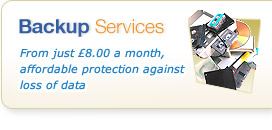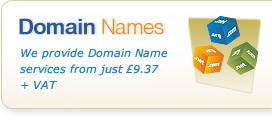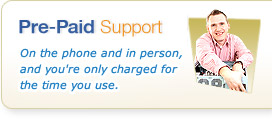5 Bad IT Ideas -- NAS Drives (Part 2)
16th July 2014
In our last blog we started explaining why we believe that NAS Drives are a Bad Idea. If you missed it, please [ read the previous blog ] first.
Problem #5 - Is someone already using that file?
Most people have a NAS because they want several people to share data. Seems sensible enough in theory, but in practice, like so many things with NAS drives, they're pretty rubbish generally at this.
Let's suppose "Joe Bloggs" opens an Excel Spreadsheet - and starts working on it. Meanwhile "Dave Smith" decides he wants to open that Excel Spreadsheet - and also starts working on it. Most NAS drives will happily let that happen, and not prevent this. The result is that both users end up saving the file over the top of each other and the last person to save's file is kept, and the other persons file is lost.
This is because most NAS drives don't monitor or understand/provide "file locks" - a simple but very useful way of ensuring users can't overwrite each others files at the same time. This means you ultimately end up wasting time and losing data - and of course aren't likely to have backups either for this since hardly any NAS drives can "go back to a previous version" either.
Problem #6 - Who is accessing that file?
The majority of NAS drives allow "anonymous access" by default - while simple to use, this means you've got no log or audit of which users are opening, editing or manipulating documents and files stored. While almost all allow you to setup users and passwords, they're often horrible to configure (especially if you're non-technical), or really unreliable.
Some will allow integration with services such as Active Directory (which is the technology available on most Windows Server systems and used to provide usernames/passwords) - when this works it can work better, but often it's complex to setup (and likely to need an IT skilled engineer). That aside, if you've already got a server, we can't see any good reason to have a NAS rather than use the server for your storage. It'll be much easier all round.
Problem #7 - When the NAS goes "boom"
Sooner or later something will go wrong with your NAS, or the drives inside. When it does, recovering can be difficult - even if we assume for a moment you have proper backups for your NAS. The NAS systems and software are often very awkward, don't actually tell you enough to identify problems well, or require all kinds of obscure recovery routines to try and get them going.
in our experience though, the chances are the NAS has the ONLY copy of data on, so we have to do a much more lengthy recovery process to try and get the data off a failed/failing NAS drive, which can be very slow and tedious - so you could be without your data for several days - especially if you have a large sized drive or RAID system in your NAS - not least because they can be TERRIBLE at copying speeds (don't be fooled - just because it says "gigabit" doesn't mean you'll get anywhere near that for all kinds of reasons).
Problem #8 - Night time -- goodbye NAS!
Some NAS drives we've encountered "sleep" when they're not being accessed. In theory this is good for the environment etc. In reality, we find that these NAS devices are often very unreliable at waking back up again - so you end up having to reboot them to reconnect. That's hassle, risks causing the NAS to fail or think there is a problem with the drives etc, and makes it seriously annoying. We've seen them do this too in the middle of the day because for 30 minutes everyone had gone to lunch. While some NAS drives can be configured not to turn off - but some do it regardless or don't have an option.
Problem #9- Many apps won't support them...
Lots of software won't be happy accessing files on a NAS drive, or the performance issues of the NAS (see below) cause problems. For example, Quickbooks specifically state you shouldn't use a NAS in later versions. Sage has the same view. Microsoft have few software products that work with a NAS - you can't use them for Exchange or SQL data (although why you'd want to is anyone's guess)
Any application that needs to be installed explicitly on a server is out - we've seen quite a few people buy a NAS thinking it's a server - it isn't. Some NAS systems have a limited range of "apps" you can install - but like everything else they're limited, slow and won't be the full applications you are likely to want.
Problem #10 - Even when it is working...
The chances are they'll be slow. Most NAS drives at the low price end of the market are pathetically slow - some are so bad you can't realistically stream content from them, while others are so variable and struggle to cope when you have several people accessing them.
To get decent performance you have to spend much more money - by which time you might as well get an entry level server - enjoy easier upgrades, more choice and better performance, plus the ability to run other applications and so on with them.
Conclusion
Please don't buy a NAS. Ever. If you think you can hear someone screaming every now and then, it's probably coming from Exeter where one of our engineers is having to bail someone out of yet another NAS failure... and you wouldn't want to make everyone cry now would you?
If you're looking to have a centralised storage system of sorts for your business, talk to our team about getting an entry level server system with storage. You'll be able to have the storage you want, better security, more control, easier backups and more scope to use other software and services as your needs evolve. If you've already got a NAS and are having issues, we can help you recover it and your data - but we'd recommend you seriously consider replacing it.
Speak to our team today and let us set you free from the nightmare of a NAS today. We're on 01392 950 950 and would be more than happy to help your business get a better system, reduce your risks and take away the frustration.
Missed Part 1 of this Blog? Check out 5 Bad IT Ideas - NAS Drives (Part 1)




